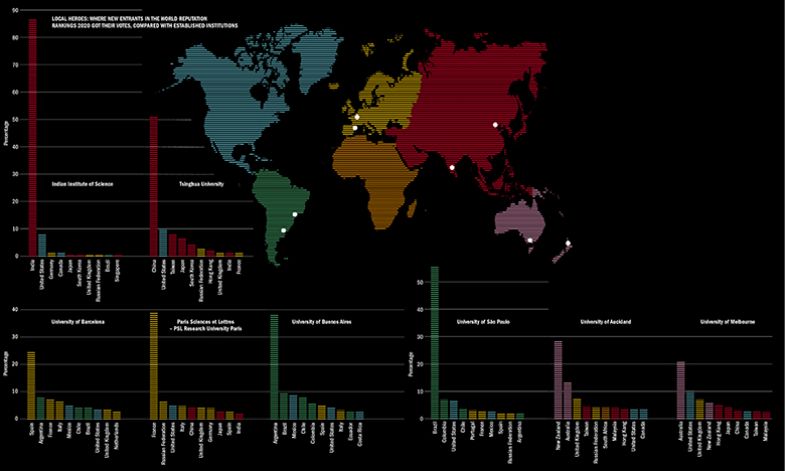Browse the THE World Reputation Rankings 2020 results
A good research and teaching reputation in higher education is a hard-won attribute that can take years to establish, but is it something initially driven regionally or globally?
These charts – which show where votes in the World Reputation Rankings 2020 originate for new entrants compared with established institutions – suggest that the answer is not always straightforward.
For three out of four of the new entrants featured, it appears that their strong performance has been helped by picking up votes from their own country or immediate neighbours.
This is particularly the case for the Indian Institute of Science, where almost 90 per cent of votes came from within India. In comparison, a more established Asian institution in the ranking, Tsinghua University, gained half its votes from China but sees more backing from a mix of other nations.
Where new entrants in the World Reputation Rankings 2020 got their votes, compared with established institutions
Click on image to enlarge
Another new entrant, the University of Auckland, also received a relatively large chunk of its votes, almost 30 per cent, from its own country, New Zealand, especially given the smaller size of the nation. Its closest neighbour, Australia, is also an important source of votes. On the other hand, the more established University of Melbourne receives 27 per cent of its votes from Australia and New Zealand combined, with the US more prominent.
And the University of Buenos Aires is perhaps another example where its breakthrough on reputation seems to owe more to its regional status. The top five nations for its votes are all in Latin America, whereas the University of São Paulo has European and North American countries in its top five (although Brazil itself is more important for its reputation than Argentina is for Buenos Aires).
However, one exception to this general rule is the newly ranked University of Barcelona, which only gets about a quarter of its votes from Spain and has attracted a lot of attention from South and North America as well as Europe. In contrast, the reputation of Paris Sciences et Lettres – PSL Research University Paris is more firmly based on votes from its own country. This may be because the Barcelona institution, while new to the ranking, was founded in 1450, while PSL is the result of a merger established in the past decade.
POSTSCRIPT:
Print headline: Nice neighbours
Register to continue
Why register?
- Registration is free and only takes a moment
- Once registered, you can read 3 articles a month
- Sign up for our newsletter
Subscribe
Or subscribe for unlimited access to:
- Unlimited access to news, views, insights & reviews
- Digital editions
- Digital access to THE’s university and college rankings analysis
Already registered or a current subscriber?







